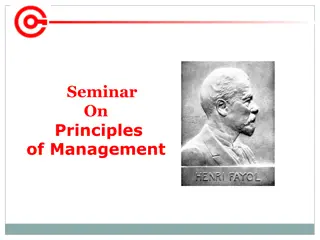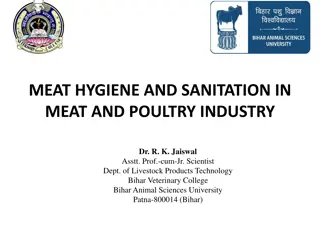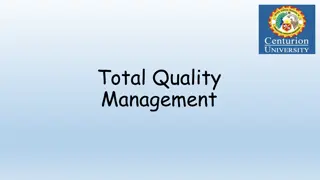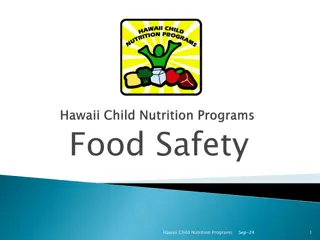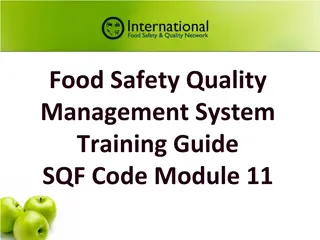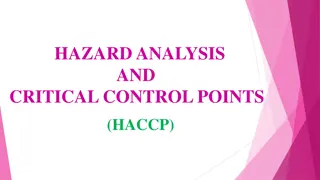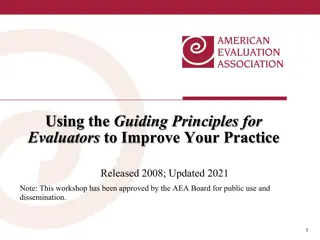ILO Fundamental Principles and Rights at Work
Explore the 5 fundamental principles and rights at work outlined by the ILO, emphasizing social justice and decent work. Delve into how these principles connect with ILO conventions and discuss challenges in their application to Pacific Island Countries.
0 views • 15 slides
Understanding Open Government Data Principles and Benefits
Open Government Data (OGD) principles and policies play a vital role in promoting transparency, citizen engagement, innovation, and data-driven decision-making in government operations. Governments worldwide are adopting open data policies to enhance accessibility, reusability, collaboration, privac
0 views • 36 slides
Supplier Onsite Assessments for Food Safety Compliance
Conducting onsite assessments at food suppliers producing ice cream products, RTE nuts, and RTE spinach dairy dip reveals critical findings related to process control, equipment maintenance, environmental monitoring, and microbial hazards. The assessments highlight gaps in HACCP design/validation, e
2 views • 8 slides
Principles of the Ghana Civil Service Code of Conduct
The Code of Conduct for the Ghana Civil Service, outlined by Elizabeth Obeng-Yeboah, emphasizes principles such as abiding by the constitution and laws with dignity, integrity, and professionalism. It sets standards for conduct, avoiding conflicts of interest, maintaining political neutrality, and u
1 views • 34 slides
Overview of Food and Beverage Management at President Hotel, Athens
Food and Beverage Management at President Hotel in Athens involves various roles such as F&B Manager, Assistant Manager, Chef, and service staff. The department oversees bars, banquet services, room service, and more. The main duties include HACCP compliance, menu planning, cooperation with other de
0 views • 15 slides
InterManager's General Principles of Conduct and Action
InterManager, a prominent trade association in the shipping industry, has established General Principles of Conduct and Action to uphold ethical standards, promote safety, environmental protection, and continuous improvement. These principles guide members towards integrity, professionalism, and acc
2 views • 72 slides
Advocating Together for Academic Freedom - Importance and Principles
Advocating for academic freedom is crucial for the advancement of knowledge and quality education. The American Association of University Professors (AAUP) champions academic freedom, shared governance, and economic security for faculty members. The 1940 Joint AAUP/AAC&U Statement of Principles on A
4 views • 14 slides
Introduction to SFBB: A Safer Food Management System
Discover how Safer Food, Better Business (SFBB) can help food businesses comply with legal requirements, implement safe methods, and maintain food safety management procedures based on HACCP principles. Learn about the benefits of introducing SFBB, its easy-to-understand and flexible nature, and how
3 views • 15 slides
Understanding the Core Principles of the 2030 Agenda for Sustainable Development
Explore the key features and principles of the 2030 Agenda for Sustainable Development with a focus on its core principles of Universality, Leaving No One Behind, Interconnectedness and Indivisibility, Inclusiveness, and Multi-stakeholder Partnerships. This comprehensive agenda encompasses 17 Sustai
5 views • 11 slides
Understanding Business Ethics Theories and Principles
Explore various business ethics theories including Ethical Concepts, Moral Behavior Development, Ethical Principles, and the Role of Ethics in Business. Delve into the concept of ethics, moral behavior evolution, ethical principles like autonomy, honesty, justice, and integrity, and the importance o
10 views • 17 slides
Academic Freedom and Shared Governance in Higher Education
Academic Freedom and Shared Governance are foundational principles advocated by the American Association of University Professors (AAUP) to ensure educators have the freedom to explore, research, teach, and discuss without censorship. These principles empower educators to enhance student learning an
0 views • 9 slides
Essential Principles of Management Discussed in Seminar
Explore the foundational principles of management discussed in a seminar on principles of management. Delve into topics such as division of work, authority, discipline, unity of command, and unity of direction as outlined by Henri Fayol. Gain insights into the importance of these principles for effe
0 views • 22 slides
Understanding Neuroplasticity: 10 Principles for Brain Rehabilitation
Explore the 10 principles of neuroplasticity for brain rehabilitation, including key concepts like "use it or lose it," specificity of exercises, and the importance of salience and intensity in therapy. Learn how practicing skills can strengthen neural connections and how therapists can help manage
6 views • 13 slides
International Law of War: Nuremberg Principles and Accountability
The Nuremberg Principles, derived from the trials of Nazi officials for war crimes, establish accountability in international law. These principles hold individuals responsible for committing acts considered crimes under international law, regardless of their position or orders received. The assumpt
2 views • 22 slides
Promoting Ethical Principles in Social Science Research
Explore the challenges and strategies for translating and applying ethical principles, especially in emergency contexts. Learn key questions in social science research and how to ensure information contributes to community actions. Understand the importance of considering ethical principles in all w
0 views • 21 slides
Understanding HARPC and Its Food Safety Implications
The implementation of HARPC (Hazard Analysis and Risk-Based Preventive Controls) under the Food Safety Modernization Act (FSMA) represents a significant shift towards preventive measures in ensuring food safety. This reform impacts various stakeholders in the food industry, emphasizing the identific
0 views • 17 slides
Understanding Food Safety Legislation and Supervisory Roles in the Hospitality Industry
Explore the crucial role of supervisors in upholding food safety legislation in hospitality settings. Learn about the principles, processes, and responsibilities related to food safety and health regulations. Understand the significance of HACCP, government involvement in food safety, and employer a
0 views • 51 slides
Importance of Meat Hygiene and Sanitation in the Meat Industry
Meat hygiene is essential to ensure the safety and suitability of meat for consumers. It involves implementing specific standards and regulatory actions to maintain cleanliness and prevent contamination at all stages of production. Proper cleaning and sanitization practices, adherence to legal stand
0 views • 16 slides
Study Guide for Principles of Management Course at Africa Research University (ARU)
Welcome to Africa Research University (ARU)! This study guide is designed to help you navigate through the Principles of Management course (Course Code: PRM4) at ARU. It provides an introduction to the course content, emphasizing the importance of developing management skills to effectively lead and
1 views • 40 slides
Food Safety and Quality Management in the Food Industry
Food safety is a critical concern in the food industry due to frequent outbreaks and consumer uncertainty. To meet market needs and legal requirements, producers must adhere to specific standards and implement systems for managing quality and safety. Quality assurance systems like GAPs, GMPs, and HA
2 views • 12 slides
Key Principles of Insurance Explained with Visuals
Understanding the principles of insurance is crucial for both insurance seekers and companies. The principles include Utmost Good Faith, Insurable Interest, Indemnity, Contribution, and Subrogation. These principles ensure transparency, fairness, and protection for policyholders. Visual representati
0 views • 6 slides
Principles of Training: Overload, Specificity, and Progression
Principles of training encompass overload, specificity, and progression. Overload requires doing more than usual, specificity involves tailored activities, and progression ensures gradual advancement. These principles are vital for improving fitness levels safely and effectively, emphasizing the nee
8 views • 17 slides
Ensuring the Safety and Quality of Food through HACCP Principles
Food quality and safety are crucial for consumer well-being. Effective programs such as HACCP help identify, evaluate, and control food safety hazards. This systematic approach focuses on prevention rather than reaction, ensuring the production of wholesome and nutritious food. Learn about the key p
0 views • 33 slides
Mastering Good Food Hygiene and Storage Practices
Understanding food spoilage causes, common food-poisoning bacteria, conditions for bacterial growth, ways to prevent food contamination, safe food handling practices, HACCP concept, types of perishable foods, importance of proper food storage, packaging materials for food, and recognizing signs of f
1 views • 27 slides
Ensuring Food Safety in Hawaii Child Nutrition Programs
Food safety practices and guidelines are essential in Hawaii Child Nutrition Programs to prevent diseases like Rat Lungworm. Measures include thorough inspection and rinsing of produce, compliance with regulations for washing produce, and following protocols such as HACCP principles. Regular monitor
0 views • 25 slides
Effective Partnership and Mutual Accountability in Nutrition Clusters
The content discusses the minimum commitments needed for participation in Nutrition Clusters, explains the Principles of Partnership, and explores how these principles can enhance coordination and accountability to affected populations. It emphasizes partner commitments, such as leadership, mainstre
0 views • 7 slides
Overview of Fundamental Principles of Space Law and Outer Space Treaties
The content discusses the fundamental principles of space law highlighted at the United Nations Space Law Conference 2020, focusing on key treaties such as the Outer Space Treaty of 1967 and associated rights, duties, and obligations of states in space exploration and use, including non-appropriatio
0 views • 16 slides
Overview of Directive Principles of State Policy in Indian Constitution
Directive Principles of State Policy (DPSP) in the Indian Constitution encompass social, economic, and political programs aimed at realizing ideals of justice, liberty, equality, and fraternity. They are non-justiciable but guide the state in legislative matters. Classified into Socialistic, Gandhia
0 views • 24 slides
SQF Code Certification Levels and Requirements Guide
SQF Code offers three certification levels: Level 1 focuses on Food Safety Fundamentals, Level 2 incorporates HACCP Food Safety Plans, and Level 3 integrates Quality Management Systems. The certification process involves selecting modules, registering in the assessment database, designating a practi
0 views • 10 slides
Food Protection Programs Implementation Guidelines
This document outlines the requirements and procedures for food protection programs installation as per regulations specified in DA Pam 30-22. It covers aspects such as food risk management, training, integrated pest management, and the Army Composite Risk Management process. Emphasis is placed on m
0 views • 15 slides
Understanding HACCP Terminology and Necessity
Hazard Analysis and Critical Control Points (HACCP) play a crucial role in ensuring food safety. This article emphasizes the necessity of HACCP, outlines key terminology such as hazards, contamination, control measures, critical control points, and provides insights into HACCP plan, risk assessment,
0 views • 18 slides
Understanding FAIR Principles in Biomedical Research
The FAIR principles - Findable, Accessible, Interoperable, and Reusable - provide a framework for ensuring scientific data in biomedical research is managed and shared effectively. This informative session delves into the theory and practice of FAIR principles, emphasizing the importance of data qua
0 views • 28 slides
The FAIR Principles for Data Management and Stewardship
Embrace the FAIR principles - Findable, Accessible, Interoperable, Re-usable - for effective scientific data management and stewardship. Learn how annotations enhance data FAIRness and the key attributes of each principle. Dive into the high-level guiding principles that ensure data is globally uniq
0 views • 25 slides
Understanding the Guiding Principles for Evaluators
This content provides insights into the Guiding Principles for Evaluators, including their history, assumptions, and key principles such as Systematic Inquiry and Competence. The workshop aims to increase knowledge about ethical evaluation practices and stimulate discussions within the evaluation co
0 views • 22 slides
Guiding Principles for GETSI/INTEGRATE Webinar – Materials Development and Goals
The webinar presented by David Steer from the University of Akron focuses on guiding principles for material development in the context of GETSI/INTEGRATE modules. It outlines goals for the session, including discussing components of the guiding principles, examples of meeting those principles, and
0 views • 13 slides
Understanding Henri Fayol's 14 Principles of Management
Henri Fayol, the Father of Modern Management, introduced 14 Principles of Management in 1916, outlining essential guidelines for effective management. These principles cover areas such as division of work, authority and responsibility, discipline, unity of command, and unity of direction. By followi
0 views • 19 slides
Principles of Management: Understanding Henri Fayol's 14 Key Principles
Explore the foundational principles of management through the lens of Henri Fayol's 14 key principles, which offer valuable insights into managerial decision-making and organizational interactions. Delve into the history of Henri Fayol, his contributions to management theory, the concept of authorit
0 views • 14 slides
Providing Meals in Early Education Centers: LAUSD Food Services Division Training
Learn about the Early Education Process (EEC) and USDA regulations for meal provision in Early Education Centers. Topics covered include mandatory postings, meal service requirements, staff responsibilities, and HACCP procedures for food safety. Training provided by the LAUSD Food Services Division.
0 views • 79 slides
Legal Principles of Insurance
The legal principles of insurance include indemnity, insurable interest, subrogation, and utmost good faith. These principles ensure fair compensation, financial risk protection, and honesty in insurance contracts. Understanding these principles is crucial for both insurers and policyholders to navi
0 views • 18 slides
Evolution of HACCP in Microbial Food Safety: A Comprehensive Overview
Explore the evolution of Hazard Analysis and Critical Control Points (HACCP) in ensuring microbial food safety, from its development in the 1960s for astronaut food to its mandatory regulations in the food industry. Discover key principles, challenges, and control measures associated with PR/HACCP i
0 views • 19 slides











